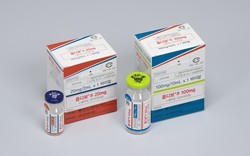BMS’ anticancer drug Opdivo (nivolumab) in combination with chemotherapy as a first-line treatment of gastric and esophageal cancer improved the overall survival (OS) and progression-free survival (PFS) in gastric and esophageal cancer patients, compared to chemotherapy alone in a phase-3 trial, BSM said.
BMS and Ono Pharmaceutical released the results of the phase-3 CheckMate-649 study at the virtual meeting of the European Society for Medical Oncology (ESMO) on Monday.

The trial compared the Opdivo-chemo combo with chemotherapy alone in patients with unresectable, advanced or metastatic gastric cancer, gastroesophageal junction cancer, or esophageal adenocarcinoma.
The study results showed that the combo treatment extended OS and PFS in patients whose tumors express PD-L1 with a combined positive score (CPS) of 5 or higher. The OS extension occurred in all randomized patients, BMS said.
The median OS in PD-L1 expressing patients with CPS of 5 or higher was 14.4 months in the Opdivo-chemo group, versus 11.1 months in the chemotherapy alone group. The median PFS was 7.7 months in the former group, and six months in the latter.
The OS benefit was also shown in PD-L1 positive patients with CPS of 1 or higher and all the randomized patients. The median OS was 14 months in the combo treatment group, compared to 11.3 months in the chemotherapy alone group. Among all the randomized patients, the median OS was 13.8 months in the combo treatment group and 11.6 months in the chemotherapy alone group.
However, more treatment-related adverse effects (TRAE) occurred in the Opdivo-chemo group than the chemo alone group. Any-grade TRAEs occurred in 22 percent of patients treated with Opdivo plus chemo, versus 12 percent of those treated with chemo alone. Grade 3 or 4 TRAEs occurred in 17 percent of the former group, compared to 10 percent of the latter.
Ian M. Waxman, development lead of Gastrointestinal Cancers at BMS, said the CheckMate-649 study showed Opdivo plus chemotherapy's potential to become a new standard of care regardless of tumor location.
He added that the company would share the study results with global health authorities.
The Korean regulator has yet to approve Opdivo plus chemotherapy as the first-line treatment for patients with unresectable, advanced or metastatic gastric cancer, gastroesophageal junction cancer, or esophageal adenocarcinoma.

